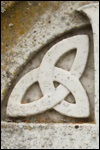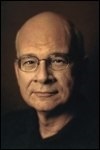Q: How can churches fight heresy when laypeople teach others?
A: It's my firm conviction that churches ought to foresee the unhappy possibility of heresy getting in when lay folk are leading, and counter the possibility by what in the history of the church's life has been called catechesis. The second and third centuries were the high peak of catechesis. These weren't catechism classes, because that suggests that it was all done by question and answer, such as we are used to when we think of catechizing children. But catechesis is the teaching of the truths that Christians live by, and linked with that it's the teaching of how to live by those truths. It's a practical, pastoral discipline of instruction.
In the second and third centuries the inquirers didn't have any Christian background; they didn't even have any theistic background. They were polytheists—they came out of various pagan cults, and so the catechists had to begin at the beginning and take them through the whole body of Christian doctrine. They did not separate truths from each other in order to focus on them in isolation. They taught the whole Christian view—God's great economy of grace for the salvation of sinners, and the syllabus was essentially the themes of the Apostle's Creed.
The Apostle's Creed was used for a congregational confession of faith as one element in Christian worship. But originally all the material in the Apostle's Creed was catechetical material or topics. And if we could recover catechesis as a regular element of church life, we'd be anticipating a lot of these problems, because we'd be constantly sustaining orthodoxy and reminding people of what the Christian faith is when you put it all together as a single ball of wax. I am currently writing articles and more to try and renew the vision of catechesis.
In the absence of catechesis, when lay people who believe themselves to have a teaching gift deviate into heresy, certainly something must be done—you don't just let them go on doing it. Those under this person's teaching must take a complaint to the leadership of the congregation. Then it's the leadership group's responsibility to handle it, which means they should ask the person who's been making the waves to explain him or herself. You hope that the person in error will allow him or herself to be put straight.
Churches are responsible for weeding out heretical teaching—that's pretty clear from the New Testament. And in those early days of Christianity, there were any number of cults and false views. Christian truth had in it, right at its center, two convictions which the secular sects simply couldn't handle and rejected out of hand. Conviction number one is the plurality of persons within the unity of God—Father, Son, and Holy Spirit. And number two was the reality of incarnation. The Divine Spirit —or the second person of the godhead, as Christians would say—took to himself everything that's involved in being human so that now the divine person is as truly human as he is divine. And all around the churches throughout the Roman Empire, you had these groups that found Christianity very attractive, but they were trying to reconstruct it in terms that didn't involve a Trinity and the incarnation. So it was very necessary then, and is still necessary now, that Christians defend the Trinity and the incarnation.
In this post-Christian age, it's a very potent fantasy that all religions are somehow one; somehow they are the same religion, pointing to the top of the same mountain. And as we climb, we become more and more aware that we're getting closer to everybody else who is climbing by other paths—Muslim, Buddhist, Hindu, or whatever. But we're all climbing the mountain and we're all getting closer to each other, and when we get to the top, well, we shall find that we're totally together. It's a sweet dream but the early Christians rejected it out of hand and so should we.










